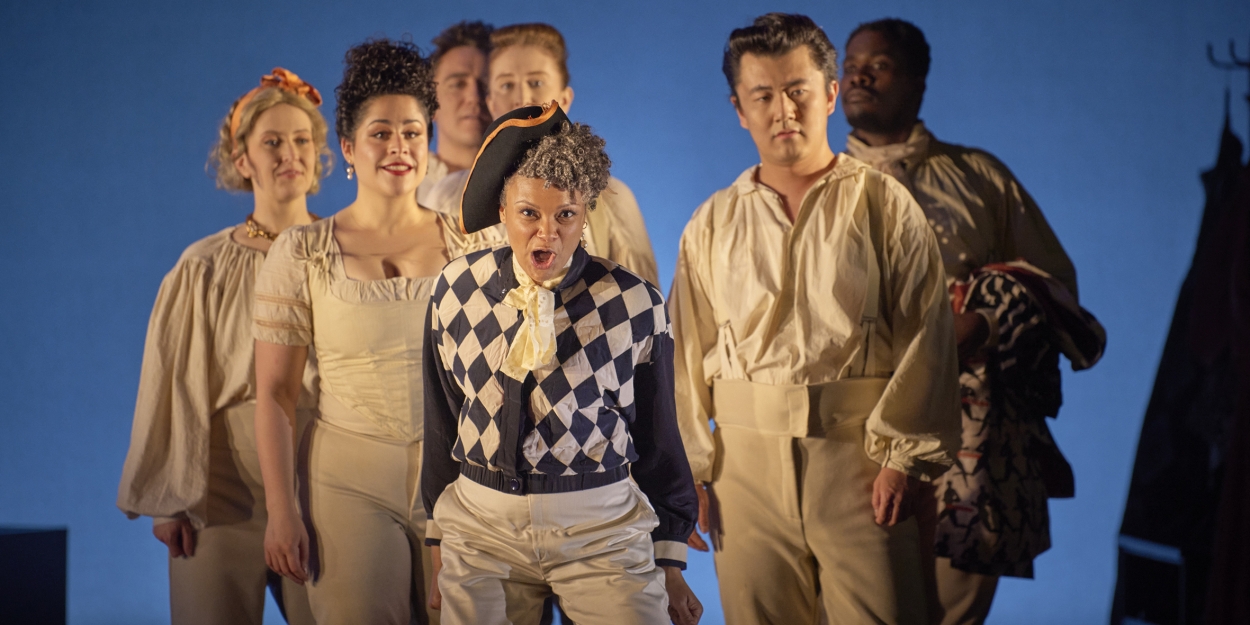Review: L'OLIMPIADE, Royal Opera House
Convoluted baroque opera is nevertheless a delight for the ears

 You can’t say that the Irish National Opera takes the easy or predictable options - so you can put your Carmens and La Bohèmes on the backburner for now. They follow up last year’s searing, distressing Least Like The Other, Searching For Rosemary Kennedy with a work from Vivaldi, L’Olimpiade, a co-production with NOF - Nouvel Opéra Fribourg and the Irish Baroque Orchestra.
You can’t say that the Irish National Opera takes the easy or predictable options - so you can put your Carmens and La Bohèmes on the backburner for now. They follow up last year’s searing, distressing Least Like The Other, Searching For Rosemary Kennedy with a work from Vivaldi, L’Olimpiade, a co-production with NOF - Nouvel Opéra Fribourg and the Irish Baroque Orchestra.
A Paris 2024 tie-in perhaps? Not really, as the libretto (by Pietro Metastasio) refers only tangentially (but crucially) to the Games and is more connected to its inspiration, The Trial of the Suitors from Book Six of The Histories of Herodotus. If that’s giving you flashbacks to the sources of some of Shakespeare’s plays, you would be right, as the plot comprises some of the Bard’s favourite devices - disguised lovers, arrogant kings and redemption once all is revealed.
Like some of Shakey’s works, and despite the best efforts of director, Daisy Evans, it’s tricky to follow until the dominoes fall into place as true identities become known and everyone, as if recovering after a midsummer night’s dream, is paired off appropriately. Roll in trouser roles for women playing men, almost unpronounceable names and, on press night both a part sung from the pit and an unscheduled break for a medical emergency, and I was considering drawing a diagram or two at the interval to sort out the who’s whos.
It’s lovely to look at, designer, Molly O’Cathain finding a cohesive theme drawn from Greek ceramics and Jack Wiltshire often bathing the Linbury’s stage in Mediterranean hues, all golden hour softness under a halo. Peter Whelan’s small orchestra, his harpsichord to the fore, does an excellent job too, even if the tunes can be a little samey beyond two or three standout arias. With no chorus, it would have been good to hear a little more work in harmonies, but most of the singing was done individually and with great skill.
%2C%20Sarah%20Richmond%20(Argene)%2C%20Gemma%20N%C3%AD%20Bhriain%20(Megacle)%2C%20Chuma%20Sijeqa%20(Clistene)%2C%20Rachel%20Redmond%20(Aminta)%2C%20Meili%20Li%20(Licida)%20and%20Alexandra%20Urquiola%20(Aristea)%20INO%20L'Olimpiade_photo%20Ros%20Kavanagh.jpg)
The opera is nearly 300 years old, so includes parts for castrato singers (a practice that was only banned in the early 20th century) but now sung by sopranos in trouser roles and the always thrilling countertenors. Meili Li isn’t quite as ethereally ‘other’ as some I have heard, but he vests his amorous Licida with an uniqueness that makes his heroic love for Aristea (Alexandra Urquiola) believable… until he is forced to relinquish it.
The other standout voice is soprano, Rachel Redmond, as Aminta, who directs the action, often singing directly to us. Redmond has a delicacy of tone that brings light and shade to the opera - with her in charge, we’re sure of a happy ending no matter how bleak things may look. She’s also keen to invite us into the conceit, one underlined by the singers donning costumes on stage underlining the artifice of what we see and hear.
Purists will enjoy an opera updated, but still with its roots showing - as, indeed, they should. For those of us looking for more of a compelling story and an emotional rollercoaster, the two hours 40 minutes of this new production can feel a little longer than is necessary. Oh, and you don’t really need a diagram to keep up - not once they’re all hand-in-correct-hand anyway!
L'Olimpiade is at the Royal Opera House and then on tour
Photo Credits: Ros Kavanagh
Reader Reviews

Videos

